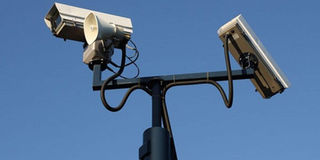Why Museveni’s cameras cannot solve rising crime

What you need to know:
Cameras help in the identification of suspects/crime perpetrators but do not prevent commission of crimes. A number of NGOs have reported break-ins into their offices and property stolen and luckily, some had CCTV cameras on their premises, provided footage to police but no suspect has ever been brought into custody.
Analysis. President Museveni last Friday directed the ministry of Finance and the police to urgently work out a plan for procurement and installation of Closed Circuit Television (CCTV) cameras in all major towns and along highways, an idea he said has been in works for a while but was left to dust away due to competing priorities.
The knee-jerk directive came on heels of last Friday’s gang-style execution of Assistant Inspector of General of Police Andrew Felix Kaweesi along with his bodyguard Kenneth Erau and driver Godfrey Wambewo about 100 metres from his home in Kulambiro, Nakawa Division in Kampala.
“Remember the incidents of Joan Kagezi, Maj Mohammed Kiggundu and a number of Sheikhs. They were killed in the same manner. If you notice such characters and especially if they are trailing a person with armed guards, you should take prompt action and challenge them,” he said.
The President, Inspector General of Police Kale Kayihura and heads of other security organs like on all previous occasions, have promised full investigations and to bring the suspects to book. What is so far obvious is Kaweesi’s assassination was no ordinary village-murder.
While Ugandans have grown accustomed to promises of ‘full investigations” the President’s directive on CCTV cameras as a response not only to Kaweesi’s murder but the high levels of criminality everywhere you turn, generated mixed reactions particularly given the enormous budget commanded by the security sector, including police.
Finance ministry spokesperson Jim Mugunga, said the President’s directives must be implemented as soon as they are formally communicated.
“There will still be discussions on modalities of implementing them. We have in the past several years worked closely with the police...we shall find means,” Mr Mugunga said.
This newspaper reported late last year that the police Director of Research and Planning, Mr Edward Ochom, had been carrying out assessments countrywide to identify sites to locate the cameras—and markedly on all the city streets and nine major routes in Kampala Metropolitan Area.
Kampala Metropolitan Area covers Kampala, Mukono and Wakiso districts. While cameras can go a long away in helping police authorities and other security organs in dealing with crimes in the country, what is not clear is how far they can go in an environment where impunity is a daily routine, planned urbanisation is seemingly not a concern for authorities and almost every suburb is a hodgepodge of settlements.
This is to mention the unregulated boda boda [motorcycle] business, the recent efforts to do so by Kampala Capital City Authority (KCCA) suffered a stillbirth reportedly at the hands of their powerful owners.
Kaweesa’s assassination added to a pattern of unknown assailants riding on motorcycles, shooting their victims and ensuring they are dead before vanishing into thin air, which Security minister Lt Gen Henry Tumukunde described as a show of “fearlessness and confidence.”
The 2016 crime report by Flying Squad Unit showed that several high calibre guns among others SMGs and Micro Uzi made from Israel or Singapore were in the hands of criminals.
Similarly, recent police statistics showed that of the 4,500 murder cases committed during the last four years, less than 100 had been successfully investigated and culprits convicted, which startlingly goes beyond more than absence of cameras.
Sometime in 2013, the Internal Affairs ministry and police were said to be in talks with a Chinese firm to supply the cameras, a deal marred in some controversy. The cameras were to be backed by a database of the national identity card project, which was eventually jumpstarted by the late Gen Aronda Nyakairima.
Cameras help in the identification of suspects/crime perpetrators but do not prevent commission of crimes. A number of NGOs have reported break-ins into their offices and property stolen and luckily, some had CCTV cameras on their premises, provided footage to police but no suspect has ever been brought into custody.



